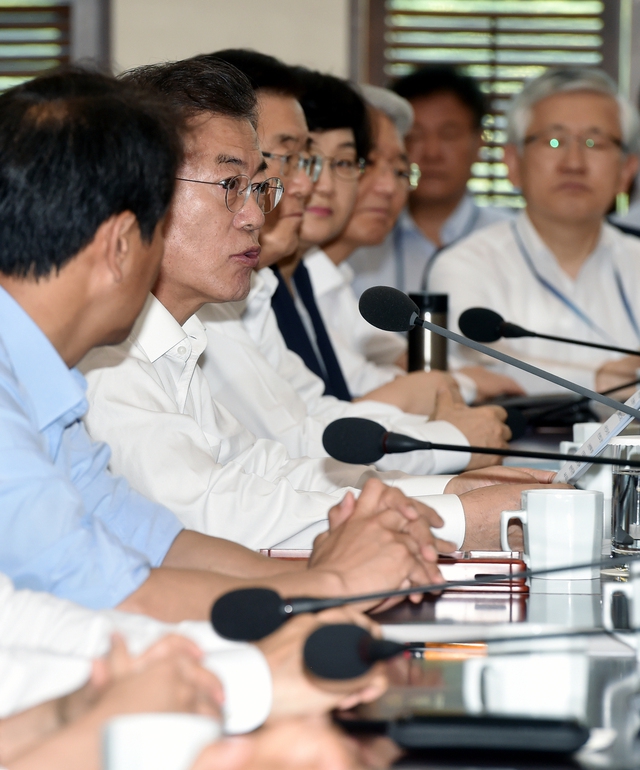Posted on : Jul.17,2018 16:56 KST
 |
|
South Korean President Moon Jae-in presides over a meeting with senior aides at the Blue House’s Yeomin Pavilion on July 16 regarding the Minimum Wage Commission’s decision to set next year’s minimum wage at 8,350 won (US$7.42). (Blue House photo pool)
|
On July 16, South Korean President Moon Jae-in acknowledged that it was unlikely he would be able to keep his promise about the minimum wage and apologized for this. According to Moon’s campaign promise, the hourly minimum wage would need to be increased to 10,000 won by 2020. But given the minimum wage committee’s decision on July 14 to increase next year’s minimum wage to 8,350 won (US$7.42), 10.9 percent higher than this year, it’s already unlikely that Moon will be able to keep that promise. While it’s unfortunate that Moon can’t keep his promise about the minimum wage, this failure is partly inevitable in light of the current economic conditions and the employment situation.
The important thing moving forward is creating and implementing follow-up measures to prop up the income of low-wage workers who will be affected by a smaller-than-expected minimum wage increase and to support small and medium-sized enterprises (SMEs) and small business owners. The ruling party, government ministries and the Blue House will be drafting these follow-up measures during an emergency meeting on July 17, one day before they announce the government’s economic policy for the second half of the year.
It’s too late to reverse the decision of the minimum wage committee, which represents labor, management and the government. It would be best for stakeholders to moderate their frustration and demands and put their heads together to design countermeasures. In this sense, it’s significant that the National Association of Convenience Store Franchises, a group representing convenience store owners, postponed collective actions they had threatened earlier (such as simultaneously closing their doors or suspending late-night business) even as they argued that the minimum wage should be tailored according to industry and region during a press conference on July 16.
The primary responsibility for drafting the follow-up measures obviously rests with the government and the ruling party, and they essentially have two basic issues to address. The first is the question of small and micro business owners who aren’t capable of handling the increase in the minimum wage, and the second is supporting unskilled laborers.
The government needs to find ways to lower credit card fees and commercial rent and create a financial support package that would extend deadlines for repaying loans or lighten interest payments in order to help companies escape their financial difficulties. The idea of increasing next year’s funding limit for the job stability fund (130,000 won [US$115.58] per worker for businesses employing fewer than 30 people as of this year) above 3 trillion won (US$2.67 billion) is also worth serious consideration.
The most urgent matter to address is unskilled workers who could be forced out of the labor market by the higher minimum age. While the wage hike will take effect next year, efforts to trim the payroll could begin much earlier. Elderly workers – such as security staff at apartment complexes – are likely to be on the chopping block. What should be done on their behalf is creating jobs by increasing the budget for the public sector.
Another plan worth pursuing is expanding the amount and easing the requirements for the earned income tax credit (EITC), which supports low-income households who have trouble getting by despite being in the labor market.
As has been discussed at length, the minimum wage problem is rooted in the unfair relationship between the chaebols and SMEs. Given the rigidly asymmetric relationship between the two sides, the minimum wage becomes a lose-lose squabble for the little guys and ends up getting kicked down the road time and time again. We hope that the new Fair Transactions in Subcontracting Act that will be taking effect on July 17 will help improve the bargaining power of subcontractors, which are typically the weaker party in contracts.
We are also placing our hopes in the Korea Fair Trade Commission’s decision to revise the Fair Transactions in Franchise Business Act to ease the burden on franchise owners. A virtuous cycle in which a higher minimum wage boosts the domestic economy and fuels economic growth, in turn creating more jobs, requires the support of better relations between chaebols and SMEs.
Please direct comments or questions to [english@hani.co.kr]









